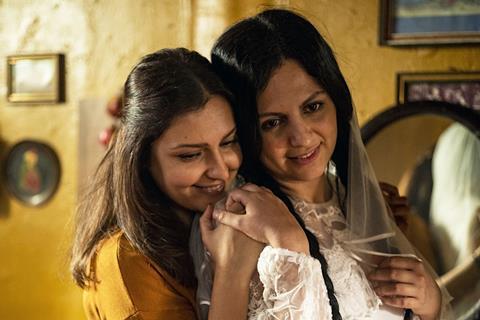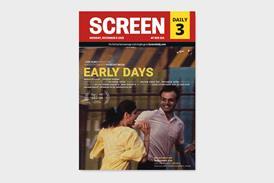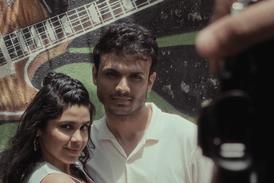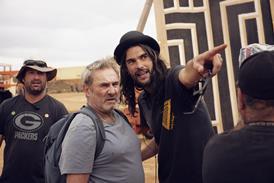Two women struggle to maintain their friendship in the Afghanistan tinder-box of the 1970s as the Russians invade

Dir: Roya Sadat. Spain/Netherlands/France/Taiwan/Greece/Afghanistan. 2024. 97min
Kabul, 1978. The friendship between two college students – Suraya (Mozhdah Jamalzadah), a wealthy socialist from a prominent family, and Sima (Niloufar Koukhani), a gifted musician from a more traditional Muslim background – is tested when their paths diverge. Roya Sadat’s drama explores a particularly turbulent period in Afghanistan’s history (the Russian invasion, tensions between various factions in Afghan’s ruling party and the revolt of the militant mujahideen) through the experiences of women. And she deftly ties together this period of the country’s history with the current plight of Afghan women under the rule of the Taliban.
The film’s use of music eases us over some of the more dislocated plotting
This is the fourth feature by Herat-born Sadat, who, with Three Dots in 2003, was the first female Afghan director active in the post-Taliban period of the early noughties. She followed this with A Letter To The President in 2017, which generated festival interest. Sima’s Song, which continues the director’s focus on female-led stories, comes to Red Sea after premiering at Tokyo and screening in Seville. Further festival bookings are certainly possible for this film which shot in Athens and rural Greece, doubling for Kabul and its outskirts.
That seems incongruous at first. With its verdant vegetation and grand architecture, it’s a world away from the battle-scarred city familiar from more recent films (there’s a brief thematic overlap with Sahra Mani’s feminist protest documentary Bread & Roses). But presumably that’s the point. In the window of peace and progress before the pressure cooker tensions and international meddling took its toll, Afghanistan was a different world, particularly for women.
The picture opens in the present day, tracking a small but vocal protest of women petitioning for “bread, work and freedom”, a chant that will be familiar to anyone who watched Mani’s film. When the Taliban attempt to disperse them with gunfire, the women raise their voices in song, led by an older woman. This is Suraya, now a grandmother marching alongside her granddaughter. She sings the song to honour her friend, Sima, her granddaughter’s namesake.
The main body of the story then unfolds in the late 1970s, a time of optimism and belief in social change for girls like Suraya and Sima. Dressed in western fashions and embracing the opportunities afforded by education, both girls have much to look forward to. A gala reception, to commemorate Suraya’s late father – a professor and political heavyweight in the ruling party, the People’s Democratic Party of Afghanistan – is a pivotal moment for both. Suraya is honoured with a prestigious government position overseeing the cause of education for women; Sima plays her rubab (a stringed lute-like instrument) and sings for the appreciative guests.
Sima’s father, who works for Suraya’s family, is disturbed by the “lustful” looks that his daughter receives during the performance and suggests that it is high time that she were married. Sima obligingly agrees; Suraya is appalled. But this is not the only area of disagreement between them. Suraya, who speaks Russian, is allied with the moderate, Socialist Parcham wing of the party, while Sima, who distrusts all politics, is drawn to Muslim militant meetings and, ultimately, opts to join the mujahideen.
Of the two, it is Suraya’s story that is more satisfyingly developed. Sima, meanwhile, seems to lurch abruptly into extremism and fundamentalism. The film’s use of music eases us over some of the more dislocated plotting. Sima’s song, a traditional Afghan melody, is an affecting recurring motif. Equally powerful is an excerpt from Shostakovich’s Leningrad symphony, played in a music class to a visibly transported Sima, cut together with another, darker sequence which shows government forces executing Sima’s father and arresting Suraya’s mother. But the film’s most effective device is also its simplest: a montage of archive photographs of Afghan women from the liberated ’70s until the present day. Everything changes, and at the same time, everything stays the same.
Production company: Alba Sotorra S.L., BALDR Film
International sales: Pluto Film info@plutofilm.de
Producer: Alba Sotorra, Frank Hoeve
Screenplay: Roya Sadat, Aziz Deildar, Roelof Jan Minneboo
Cinematography: Ton Peters
Production design: Anna Chwaliszewska
Editing: Anna Pfaff, Ariadna Ribas
Music: Xavi Font
Main cast: Mozhdah Jamalzadah, Niloufar Koukhani, Aziz Deildar, Leena Alam, Nelofer Pazira, Max Grosse, Paeman Arianfar, Ebadi Mohammad Zobair, Halima Ahmadi, Zahra Rahimi, Maliha Sarwari























